ELENAVANNONI
theatre
ELENAVANNONI
theatre
frag-mente infernali
freely adapted La Divina Mimesis by Pier Paolo Pasolini 100° Festival al Sophiensaele Berlino 2007
Only a mute voice in this time too busy with other things. Thus Pasolini asks what role the artistic creation and what role an intellectual today. Perhaps this is to investigate the sense of reversal in which the ephemeral becomes essential that the poet goes over, like Dante before him, his Inferno, one of our Hell. Hell and a neo-capitalist consumerism where Resist falters and the flight becomes increasingly the only option.
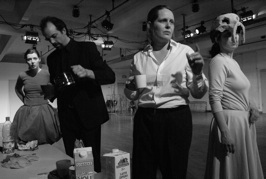
Frag-mente infernali - directed by Elena Vannoni and included in the program of the of the Italian Festival of the Theatre in Berlin - is an innovative play inspired by the Divina Memesis by Pier Paolo Pasolini. The text, built on a multi-languages notation, conducts the audience into a neo-capitalistic Inferno, in which Paolini-himself and Pasolini-Poet are seeking the meaning of Art and Poetry
Corriere di Italia
Synopsis
What is the Inferno of Pasolini? Reinventing the semantic of the Divine Comedy - the allegorical poem by Alighieri - Pier Paolo Pasolini creates his own neo-capitalistic Inferno. The author - playing the roles of Dante-himself and of Virgilio-Poet - begins a journey aimed to inquire what are the roles of the Artist and the Scholar in times of a neo-capitalistic society. “I was tented to interrupt my journey and returned to the real world, where at least, I was only asked for silence” quoted Pasolini. But his journey continued as a catartic metaphor of personal and universal choises, intended to resist to discutible "new values" of a certain neo-capitalistic economy of leading countries. The Divina Mimesis was published in 1975 - subsequently the author's death - in form of literary notes and fragments, to respect the author's concept of a real time diary, that witness the drawing up process. Its documentaristic structure applies the same question to the present audience: what is our Inferno?The intention is not giving an answer, but relies to the "undefined canon" of Pasolini literary heritage.
The Divina Mimesis was published in 1975 - subsequently the author's death - in form of literary notes and fragments, to respect the author's concept of a real time diary, that witness the drawing up process. Its documentaristic structure applies the same question to the present audience: what is our Inferno? The intention is not giving an answer, but relies to the "undefined canon" of Pasolini literary heritage.
“In the present times, engaged in other than the present, only a deaf voice resounds.” This is a quote by Pier Paolo Pasolini, Italian author and anti conformist poet. He inquires the essence of the Artistic Creation and the role of the Intellectual in modern times. In the process of investigating how the Ephemeral becomes the Essential, Paolini-Poet - retracing Dante's steps - creates his own Inferno, reflection of our own Inferno, a neo-capitalistic and consumistic place, in which any act of Resistance vacillates and the only survival consists in escaping.
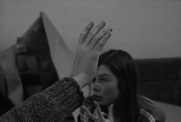
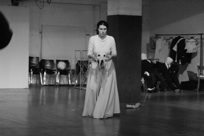
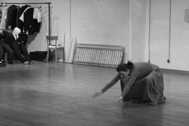
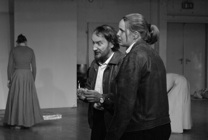
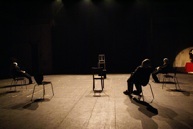
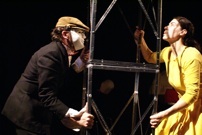

Director: Elena Vannoni
Collaboration: Roberto Mantovani
Assistent Director: Jasmin Rana Schoeler
Dramaturgin: Bettina Jänisch
Cast:
Pasolini-Virgilio Roberto Mantovani
Pasolini-Dante Chiara Visca
Lupa Andrea Schwemmer
Lonza Jessica Tietsche
Leone/RinbaudStefan Liebermann
Music:
Piano Accordion Javier Tucat Moreno
Singer Anahi Setton
Photo di Scena: Silvano Mangnone





